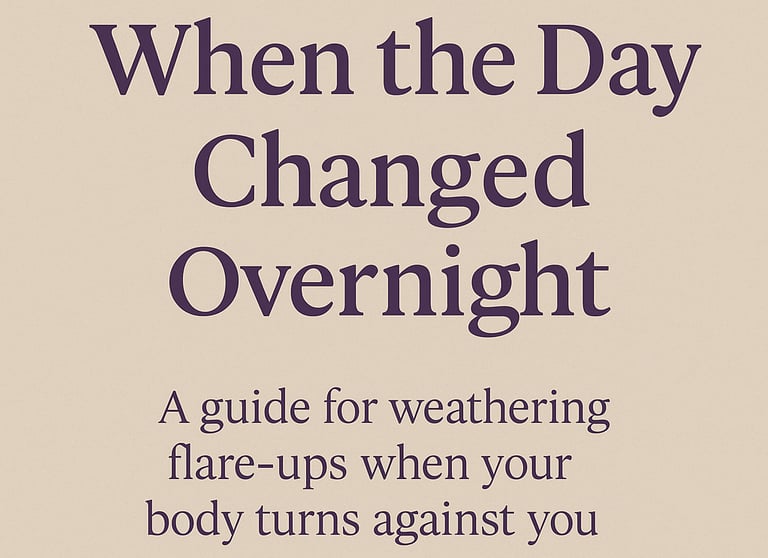When the Day Changed Overnight A guide for weathering flare-ups when your body turns against you
A sudden flare. A vanished sense of ease. In this reflective guide, Mary Monoky shares what helped her respond—not with panic, but with presence—when her body turned against her without warning. A quiet offering for anyone living with chronic illness, invisible pain, or the unspoken courage it takes to rest without apology.
Mary Monoky
8/7/20253 min read


I went to bed feeling proud. I had just finished learning how to hang wallpaper—bold tropical flowers on black. It reminded me of the garden I once revived in Florida. That day felt like progress.
But when I woke up, I knew something had shifted. Before I even stood up.
Once I did, I felt... swishy. Off. My heart was racing. My steps were unsteady.
It felt like I had a hangover—but I hadn’t been out celebrating.
I’d done something small. Something that felt good.
I made something beautiful. I took up space.
Not just physically—but emotionally, creatively.
I used what little energy I had to do something expressive.
I allowed myself to be visible. And that matters.
Was that too much? Was this my punishment for reaching beyond the narrow safety I’ve learned to survive within?
That’s the cruelty of it:
you never know what you’re being punished for—
or if you’re being punished at all.
My body had turned on me. Again.
That’s the hardest part of living with chronic illness:
No warning. No bumps, bruises, or bandages.
Nothing visible to explain the struggle.
It’s not just an invisible war—
it’s a full-scale battle inside your body,
waged in silence,
that no one else can see.
It’s isolating. It’s heartbreaking.
And still, we face it.
Here’s what helped me:
🔹 I named it. I said out loud, “This is a flare.” Naming it gave me clarity.
🔹 I sat down. Not from weakness—but from wisdom.
🔹 I used sensation. A cool cloth on my face helped me stay grounded.
🔹 I stopped pushing. I didn’t finish brushing my teeth. I listened instead.
And maybe just as important—here’s what I didn’t do:
✘ I didn’t ignore it.
✘ I didn’t tell myself I was lazy.
✘ I didn’t apologize for needing care.
✘ I didn’t chase productivity.
That silence, that pause, was its own kind of strength.
I also didn’t go down the rabbit hole.
I didn’t spend my limited energy searching for explanations.
Sometimes, especially when you're newly diagnosed, it feels urgent to figure it all out.
You search and search, hoping for clarity, hoping to feel safer.
But most of the time, those answers won’t come.
And the habit of focusing on every physical detail can pull you further from peace.
Over the decades, I’ve learned something steadier:
How to recognize weird misfires from true red flags.
How to pause without panicking.
How to choose presence over panic—when I can.
It’s not about ignoring the body.
It’s about learning which signals to honor, and which to let pass without letting them own me.
That’s not denial.
That’s wisdom.
That’s practice.
And then, I responded—not with panic, but with presence.
Not with a battle plan, but with rest.
I didn’t know what the rest of the day would hold.
I only knew what I needed next.
I crawled back to bed.
Not in defeat,
but by choice.
I put on soothing sounds.
I closed my eyes.
Maybe I napped.
Maybe I just breathed.
Either way,
I gave my body what it asked for—without apology.
This isn’t a triumph story. I didn’t “bounce back.”
But I did survive—with gentleness. And I counted that as a win.
I wasn’t grateful for the flare-up.
But I was grateful—for the acceptance, the knowledge, and the courage I’ve developed over time.
That didn’t come easy.
And my wish is to offer you something similar.
A reminder that it’s possible.
If your body sometimes betrays you—
if you're living with an illness that cancels your day without permission—
know this:
You are not alone.
The smallest wins matter.
So does being seen. 💙
Inspiration
© 2025. All rights reserved.
© 2025 Mary Monoky | MaryMonokySpeaks.com
Stories of the long middle — finding meaning, endurance, and quiet beauty.